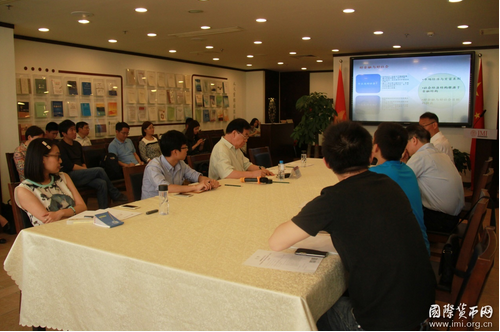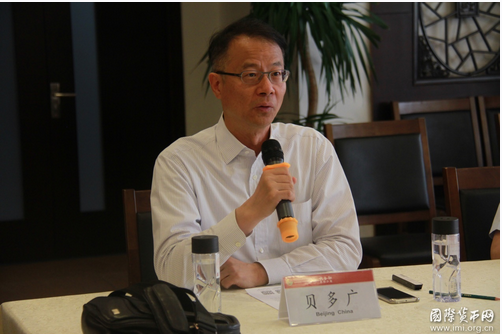Macro-Finance Salon (No. 32): The Concept, Challenges, and Prospect of Inclusive Finance
2016-05-28 IMI Starting from the pyramid structure of China’s economy and the inverted pyramid of the country’s financial service system, Professor Bei Duoguang shed light on “good finance” and “good society”. He then went to great lengths to explain the difference and relationship among inclusive finance, micro-finance, small-and-micro finance, Internet finance, and financial science and technology.
He pointed out that, currently, because of differences in risks, access to information and transaction cost, savings mobilization system was highly efficient while the credit system was inefficient, posing the greatest challenge to inclusive finance. He said that we should draw some lesson from the development of micro finance model in the international community over the past 40-plus years. Moreover, as inclusive finance is starting to move into the mainstream of financial services, we should attach equal importance to both what it brings to an enterprise and what it brings to the society. He believed that the development strategy of inclusive finance had four major factors: indicators, coordination among government departments, implementation, and focus. The key of coordination among government departments, in Bei’s view, was the building of legal framework and credibility system for corporations. Inclusive finance should develop on the basis of science and technology and gradually move toward digitalization, so as to turn China’s economic and social structure from a “pyramid” to an “olive”, and avoid the “middle income trap”.
Starting from the pyramid structure of China’s economy and the inverted pyramid of the country’s financial service system, Professor Bei Duoguang shed light on “good finance” and “good society”. He then went to great lengths to explain the difference and relationship among inclusive finance, micro-finance, small-and-micro finance, Internet finance, and financial science and technology.
He pointed out that, currently, because of differences in risks, access to information and transaction cost, savings mobilization system was highly efficient while the credit system was inefficient, posing the greatest challenge to inclusive finance. He said that we should draw some lesson from the development of micro finance model in the international community over the past 40-plus years. Moreover, as inclusive finance is starting to move into the mainstream of financial services, we should attach equal importance to both what it brings to an enterprise and what it brings to the society. He believed that the development strategy of inclusive finance had four major factors: indicators, coordination among government departments, implementation, and focus. The key of coordination among government departments, in Bei’s view, was the building of legal framework and credibility system for corporations. Inclusive finance should develop on the basis of science and technology and gradually move toward digitalization, so as to turn China’s economic and social structure from a “pyramid” to an “olive”, and avoid the “middle income trap”.
 Wei Benhua pointed out, when implementing inclusive finance policies, many cities established leading groups of inclusive finance, and laid out unified action and development plans, increasing the access to basic financial services. Also, this helps poverty reduction and raise the public awareness of inclusive finance. He added that, when working to promote the development of inclusive finance in China, we should also draw lessons from other countries.
In the Q&A session, audience raised questions and shared views over the relationship between the development of inclusive finance and that of finance, negative effects that inclusive finance may have on the economy, carriers and major players of inclusive finance, and the relationship between inclusive finance and consumer finance, etc. Mr. Bei gave answers to all these questions.
Editor’s Note:
Macro-Finance Salon is a high-level academic salon jointly initiated by IMI and the Department of Money and Banking from School of Finance of RUC. The salon aims at promoting the study and practice of Macro Finance, as well as its disciplinary program, while carrying out in-depth research on Macro-Finance theory, policy and strategy. The concept of “Macro-Finance “stems from Professor Huang Da’s fundamental idea of integrating macro and micro financial theory, which systematically regards finance and real economy as a whole. In the book of “General Theory of Macro-Finance”, Chen Yulu, Deputy Governor of PBOC, demonstrates the fundamental connotation and methodology of Macro-Finance, laying theoretical and empirical foundation for Macro-Finance framework, which facilitates long-term economic growth and stronger national competitiveness.
Wei Benhua pointed out, when implementing inclusive finance policies, many cities established leading groups of inclusive finance, and laid out unified action and development plans, increasing the access to basic financial services. Also, this helps poverty reduction and raise the public awareness of inclusive finance. He added that, when working to promote the development of inclusive finance in China, we should also draw lessons from other countries.
In the Q&A session, audience raised questions and shared views over the relationship between the development of inclusive finance and that of finance, negative effects that inclusive finance may have on the economy, carriers and major players of inclusive finance, and the relationship between inclusive finance and consumer finance, etc. Mr. Bei gave answers to all these questions.
Editor’s Note:
Macro-Finance Salon is a high-level academic salon jointly initiated by IMI and the Department of Money and Banking from School of Finance of RUC. The salon aims at promoting the study and practice of Macro Finance, as well as its disciplinary program, while carrying out in-depth research on Macro-Finance theory, policy and strategy. The concept of “Macro-Finance “stems from Professor Huang Da’s fundamental idea of integrating macro and micro financial theory, which systematically regards finance and real economy as a whole. In the book of “General Theory of Macro-Finance”, Chen Yulu, Deputy Governor of PBOC, demonstrates the fundamental connotation and methodology of Macro-Finance, laying theoretical and empirical foundation for Macro-Finance framework, which facilitates long-term economic growth and stronger national competitiveness.
